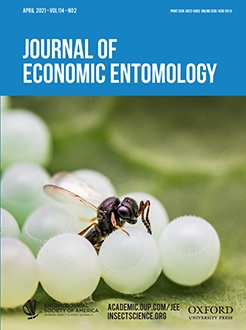Grain commodities in postharvest storage often deteriorate because of fungal and insect attacks. With the green consumption requirements of consumers, ecofriendly and safe pesticides are needed for grain storage. The current study investigated the efficacy of the plant volatile compound trans-2-hexenal against the storage insect pest Tribolium castaneum (Herbst) and three commonly occurring storage fungi, viz., Fusarium graminearum, Aspergillus flavus, and Aspergillus niger, to recommend its application as a botanical fumigant for grain commodities. trans-2Hexenal weakly repels T. castaneum but has favorable insecticidal activity against multiple developmental stages of T. castaneum, ranging in sensitivity as follows: eggs (LC50 = 14.3 µl/l) > adults (31.6 µl/l) > young larvae (42.1 µl/l) > mature larvae (64.5 µl/l) > pupae (70.5 µl/l). Moreover, trans-2-hexenal caused a high malformation rate and high mortality in adults developed from fumigated pupae. In a 7-d grain, trans-2-hexenal at 0.8 µl/ml provided an appreciable efficacy (81.3%), and concentrations ≥ 0.1 µl/ml completely inhibited the offspring of T. castaneum. trans-2-Hexenal was nonphytotoxic to the seed germination and seedling growth of wheat seeds. Furthermore, trans-2-hexenal completely inhibited the growth of A. flavus, F. graminearum, and A. niger at 5, 10, and 10 µl/l, respectively. The favorable biological activity of trans-2-hexenal against T. castaneum and three frequently occurring mycotoxigenic storage fungi indicated the potential of trans-2-hexenal for simultaneously controlling pests and pathogens, which could reduce its application frequency in grains and decrease pesticide resistance risks.
Graphical Abstract






